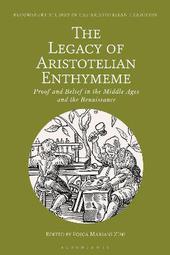
|
The Legacy of Aristotelian Enthymeme: Proof and Belief in the Middle Ages and the Renaissance
Hardback
Main Details
Description
The Legacy of Aristotelian Enthymeme provides a historical-logical analysis of Aristotle's rhetorical syllogism, the enthymeme, through its Medieval and Renaissance interpretations. Bringing together notions of credibility and proof, an international team of scholars highlight the fierce debates around this form of argumentation during two key periods for Aristotle's beliefs. Reflecting on medieval and humanist thinkers, philosophers, poets and theologians, this volume joins up dialectical and rhetorical argumentation as key to the enthymeme's interpretation and shows how the enthymeme was the source of a major interpretive conflict. As a method for achieving the standards for proof and credibility that persist across diverse fields of study today including the law, politics, medicine and morality, this book takes in Latin and Persian interpretations of the enthymeme and casts contemporary argumentation in a new historical light.
Author Biography
Fosca Mariani Zini is Professor of Medieval Philosophy at the University of Tours, France.
ReviewsThis is a book on the history of the problem of how we demonstrate by means of enthymemes. It gives a consistent account of what has happened in the twelve centuries that separate Boethius from Ramus, and it contributes to our understanding of the connection between logic and rhetoric. It revives the tradition of Ciceronianism, of which Fosca Mariani Zini is a renowned authority. * Riccardo Pozzo, Professor of the History of Philosophy, Tor Vergata University of Rome, Italy *
|